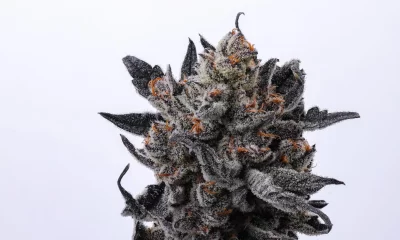Government
Medical Pot in Utah Costs Right Around National Average

Analysis was presented to Utah lawmakers.
Lawmakers in Utah met on Monday to go over the cost of medical cannabis in the state. The gist: patients there are paying no more or no less than what they would in other states where the treatment is also legal.
Local news station KUER reports that the meeting was part of the state legislature’s Medical Cannabis Governance Structure Working Group, which “listened to presentations on the analysis from the Utah Cannabis Association, Utah Cannabis Co-Op and the Center for Medical Cannabis under the Utah Department of Health and Human Services.”
The group of lawmakers compared “the cost of three cannabis products in Utah to 19 other states with medical marijuana programs,” KUER reported, and concluded that “Utahns are forking over about the average price for cannabis flower (bud), gummies and vape cartridges.”
“We were asked when working with the policy analysts to compare apples to apples, but with all of the different nuances in the different states, it really is a difficult task,” said Alyssa Smailes with Utah Cannabis Association, as quoted by KUER, who along with Utah Cannabis Co-Op “selected 19 states with various cannabis markets in different stages of progress to compare with Utah.”
The groups collected data from the “last week of July for other states and all products available for sale in Utah in July 2022,” for the three most common products: Vape Carts (38% of sales); Flower (35%); and Gummies (25%).
Scott Erikson of Utah Cannabis Co-Op told the lawmakers, “he isn’t sure why Utah’s flower market is noticeably lower than the 36 other states with medical cannabis programs,” KUER reported.
“Most states the amount of flower is over 50%. Some states it’s as high as 60%,” Erikson said, as quoted by the station. “There are all sorts of speculation as to why.”
One theory, per KUER, “is the cultural influence of The Church of Jesus Christ of Latter-day Saints,” which “doesn’t approve of smoking tobacco products but has said the use of marijuana is permitted under medical circumstances.”
Voters in Utah passed a measure legalizing medical cannabis treatment in 2018.
Patients with the following conditions may qualify for the treatment there: HIV or acquired immune deficiency syndrome; Alzheimer’s disease; amyotrophic lateral sclerosis; cancer; cachexia; persistent nausea that is not significantly responsive to traditional treatment, except for nausea related to pregnancy; cannabis-induced cyclical vomiting syndrome; cannabinoid hyperemesis syndrome; Crohn’s disease or ulcerative colitis; epilepsy or debilitating seizures; multiple sclerosis or persistent and debilitating muscle spasms; post-traumatic stress disorder (PTSD) that is being treated and monitored by a licensed health therapist, and that has been diagnosed by a healthcare provider by the Veterans Administration and documented in the patient’s record or has been diagnosed or confirmed by evaluation from a psychiatrist, masters prepared psychologist, a masters prepared licensed clinical social worker, or a psychiatric APRN; autism; a terminal illness when the patient’s life expectancy is less than six months; a condition resulting in the individual receiving hospice care; a rare condition or disease that affects less than 200,000 individuals in the U.S., as defined in federal law, and that is not adequately managed despite treatment attempts using conventional medications (other than opioids or opiates) or physical interventions; pain lasting longer than two weeks that is not adequately managed, in the qualified medical provider’s opinion, despite treatment attempts using conventional medications other than opioids or opiates or physical interventions.
Earlier this year, lawmakers in Utah passed a bill that protects medical cannabis patients in the state against discrimination in health care and public employment.
“What this bill does is it provides some clarity to what the legislative intent was… in recognizing medical cannabis as a legitimate use of cannabis for treating certain ailments such as chronic pain,” the bill’s sponsor, Republican state Rep. Joel Ferry, said at the time.
Source: https://hightimes.com/news/medical-pot-in-utah-costs-right-around-national-average/
Business
New Mexico cannabis operator fined, loses license for alleged BioTrack fraud

New Mexico regulators fined a cannabis operator nearly $300,000 and revoked its license after the company allegedly created fake reports in the state’s traceability software.
The New Mexico Cannabis Control Division (CCD) accused marijuana manufacturer and retailer Golden Roots of 11 violations, according to Albuquerque Business First.
Golden Roots operates the The Cannabis Revolution Dispensary.
The majority of the violations are related to the Albuquerque company’s improper use of BioTrack, which has been New Mexico’s track-and-trace vendor since 2015.
The CCD alleges Golden Roots reported marijuana production only two months after it had received its vertically integrated license, according to Albuquerque Business First.
Because cannabis takes longer than two months to be cultivated, the CCD was suspicious of the report.
After inspecting the company’s premises, the CCD alleged Golden Roots reported cultivation, transportation and sales in BioTrack but wasn’t able to provide officers who inspected the site evidence that the operator was cultivating cannabis.
In April, the CCD revoked Golden Roots’ license and issued a $10,000 fine, according to the news outlet.
The company requested a hearing, which the regulator scheduled for Sept. 1.
At the hearing, the CCD testified that the company’s dried-cannabis weights in BioTrack were suspicious because they didn’t seem to accurately reflect how much weight marijuana loses as it dries.
Company employees also poorly accounted for why they were making adjustments in the system of up to 24 pounds of cannabis, making comments such as “bad” or “mistake” in the software, Albuquerque Business First reported.
Golden Roots was fined $298,972.05 – the amount regulators allege the company made selling products that weren’t properly accounted for in BioTrack.
The CCD has been cracking down on cannabis operators accused of selling products procured from out-of-state or not grown legally:
- Regulators alleged in August that Albuquerque dispensary Sawmill Sweet Leaf sold out-of-state products and didn’t have a license for extraction.
- Paradise Exotics Distro lost its license in July after regulators alleged the company sold products made in California.
Golden Roots was the first alleged rulebreaker in New Mexico to be asked to pay a large fine.
Source: https://mjbizdaily.com/new-mexico-cannabis-operator-fined-loses-license-for-alleged-biotrack-fraud/
Business
Marijuana companies suing US attorney general in federal prohibition challenge

Four marijuana companies, including a multistate operator, have filed a lawsuit against U.S. Attorney General Merrick Garland in which they allege the federal MJ prohibition under the Controlled Substances Act is no longer constitutional.
According to the complaint, filed Thursday in U.S. District Court in Massachusetts, retailer Canna Provisions, Treevit delivery service CEO Gyasi Sellers, cultivator Wiseacre Farm and MSO Verano Holdings Corp. are all harmed by “the federal government’s unconstitutional ban on cultivating, manufacturing, distributing, or possessing intrastate marijuana.”
Verano is headquartered in Chicago but has operations in Massachusetts; the other three operators are based in Massachusetts.
The lawsuit seeks a ruling that the “Controlled Substances Act is unconstitutional as applied to the intrastate cultivation, manufacture, possession, and distribution of marijuana pursuant to state law.”
The companies want the case to go before the U.S. Supreme Court.
They hired prominent law firm Boies Schiller Flexner to represent them.
The New York-based firm’s principal is David Boies, whose former clients include Microsoft, former presidential candidate Al Gore and Elizabeth Holmes’ disgraced startup Theranos.
Similar challenges to the federal Controlled Substances Act (CSA) have failed.
One such challenge led to a landmark Supreme Court decision in 2005.
In Gonzalez vs. Raich, the highest court in the United States ruled in a 6-3 decision that the commerce clause of the U.S. Constitution gave Congress the power to outlaw marijuana federally, even though state laws allow the cultivation and sale of cannabis.
In the 18 years since that ruling, 23 states and the District of Columbia have legalized adult-use marijuana and the federal government has allowed a multibillion-dollar cannabis industry to thrive.
Since both Congress and the U.S. Department of Justice, currently headed by Garland, have declined to intervene in state-licensed marijuana markets, the key facts that led to the Supreme Court’s 2005 ruling “no longer apply,” Boies said in a statement Thursday.
“The Supreme Court has since made clear that the federal government lacks the authority to regulate purely intrastate commerce,” Boies said.
“Moreover, the facts on which those precedents are based are no longer true.”
Verano President Darren Weiss said in a statement the company is “prepared to bring this case all the way to the Supreme Court in order to align federal law with how Congress has acted for years.”
While the Biden administration’s push to reschedule marijuana would help solve marijuana operators’ federal tax woes, neither rescheduling nor modest Congressional reforms such as the SAFER Banking Act “solve the fundamental issue,” Weiss added.
“The application of the CSA to lawful state-run cannabis business is an unconstitutional overreach on state sovereignty that has led to decades of harm, failed businesses, lost jobs, and unsafe working conditions.”
Business
Alabama to make another attempt Dec. 1 to award medical cannabis licenses

Alabama regulators are targeting Dec. 1 to award the first batch of medical cannabis business licenses after the agency’s first two attempts were scrapped because of scoring errors and litigation.
The first licenses will be awarded to individual cultivators, delivery providers, processors, dispensaries and state testing labs, according to the Alabama Medical Cannabis Commission (AMCC).
Then, on Dec. 12, the AMCC will award licenses for vertically integrated operations, a designation set primarily for multistate operators.
Licenses are expected to be handed out 28 days after they have been awarded, so MMJ production could begin in early January, according to the Alabama Daily News.
That means MMJ products could be available for patients around early March, an AMCC spokesperson told the media outlet.
Regulators initially awarded 21 business licenses in June, only to void them after applicants alleged inconsistencies with how the applications were scored.
Then, in August, the state awarded 24 different licenses – 19 went to June recipients – only to reverse themselves again and scratch those licenses after spurned applicants filed lawsuits.
A state judge dismissed a lawsuit filed by Chicago-based MSO Verano Holdings Corp., but another lawsuit is pending.
Source: https://mjbizdaily.com/alabama-plans-to-award-medical-cannabis-licenses-dec-1/
-

 Business2 years ago
Business2 years agoPot Odor Does Not Justify Probable Cause for Vehicle Searches, Minnesota Court Affirms
-

 Business2 years ago
Business2 years agoNew Mexico cannabis operator fined, loses license for alleged BioTrack fraud
-

 Business2 years ago
Business2 years agoAlabama to make another attempt Dec. 1 to award medical cannabis licenses
-

 Business2 years ago
Business2 years agoWashington State Pays Out $9.4 Million in Refunds Relating to Drug Convictions
-

 Business2 years ago
Business2 years agoMarijuana companies suing US attorney general in federal prohibition challenge
-

 Business2 years ago
Business2 years agoLegal Marijuana Handed A Nothing Burger From NY State
-

 Business2 years ago
Business2 years agoCan Cannabis Help Seasonal Depression
-

 Blogs2 years ago
Blogs2 years agoCannabis Art Is Flourishing On Etsy













